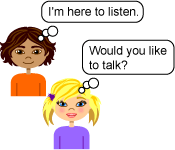|
|
|
|
|
DEPRESSION
Back to top
HOW CAN I TELL IF SOMEONE MIGHT BE DEPRESSED?
If you are worried that someone might be struggling with depression, here are some things you might look for:
| Change in mood for a couple of weeks
|
Talking about death or suicide*
|
| Not doing things he/she typically likes to do
|
Picking fights; getting into trouble; using drugs or alcohol
|
| Isolation from other people or seeming distant
|
Difficulties in school (not completing homework, missing school)
|
| Changes in relationships
|
Difficulty concentrating or making decisions
|
| Sleeping or eating more or less
|
Lots of stomachaches, headaches, and other physical problems
|
| Lack of energy or feeling tired
|
Feeling like everything is their fault
|
| Seeming sad, withdrawn, angry, irritable
|
Saying things like "I'm so stupid," "I can't get anything right," or "Things don't matter anyway, nothing will ever get better"
|
 Back to top
Back to top
HOW CAN I ENCOURAGE SOMEONE TO GET HELP?
Helping a friend who may be depressed can be challenging. It is normal to feel many different emotions (overwhelmed, confused, and angry) when you try to help someone, especially if they don't understand that you're trying to help. If your friend wants to talk, listen. Helping a friend does not mean you are responsible for fixing the problem. What you can do is be supportive and encourage your friend to get help from adults who he or she can talk to. You do not have to have all the answers or be an expert - just be a good listener.
Back to top
WHAT MIGHT BE HELPFUL?
- It is ok to talk to someone and let them know that you have been noticing changes. Use open-ended questions like "How are things going for you?" or "Would you like to talk?"
- Let your friend know that you are there to listen and support him/her, not judge or criticize.
- Offer your friend choices for how to get help, including websites, phone numbers for hotlines, or numbers for helpful adults in school or in the community.
- If you think a friend needs help, encourage him/her to get help from a professional. Do not try to solve the problem yourself, but instead offer to help with making phone calls or going to appointments.
- When you are really worried about someone's safety, it is ok to talk to them about it.
Back to top
WHAT MIGHT NOT BE SO HELPFUL?

- Avoiding the person
- Keeping your feelings or worries to yourself
- Trying to solve your friend's problems by yourself is not helpful for him/her or for you. Always seek professional advice and support from a trusted adult.
- Saying things like "Get over it" "Just try harder" "I know exactly how you feel" or "You're being too sensitive or dramatic"
Disclaimer: Material in Whyville's Wellness Center is intended as general information. It is not a recommendation for treatment,
nor should it be considered medical or mental health advice. Whyville's Wellness Center urges families to discuss all information
and questions related to medical or mental health care with a health care professional.
|
|
|
|
|